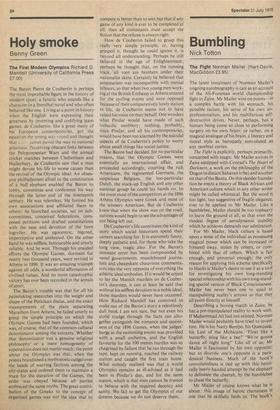Holy smoke
Benny Green
The First Modern Olympics Richard D. Mandell (University of California Press £7.00) The Baron Pierre de Coubertin is perhaps the most improbable figure in the history of modern sport, a fanatic who sounds like a character in a Stendhal novel and who often behaved like one. Living at a point in history when the English were expressing their greatness by inventing and codifying team games, de Coubertin, like a great many of his European contemporaries, got the equation the wrong way round and thought that i, 2.ames paved the way to national greatness. Perceiving obscure links between the Peloponnesian Wars and the annual cricket matches between Cheltenham and Haileybury, de Coubertin saw that a man might devote his life to worse causes than the revival of the Olympic ideal. An obsessive philhellenism allied to the constitution of a bull elephant enabled the Baron to lobby, committee and conference his way through the latter end of the nineteenth century. He was relentless. He formed his .own associations and affiliated them to others: he launched societies, sat on subcommittees, conceived federations, composed petitions and drafted constitutions with the ease and devotion of the born logroller. He was egocentric, bigoted, imperceptive and unshrewd. On the other hand he was selfless, honourable and utterly reliable. And he won. Through his unaided efforts the Olympic Games, dormant for nearly two thousand years, were revived in Athens in 1896. It was an amazing triumph against all odds, a wonderful affirmation of civilised values. And no more catastrophic victory has ever been recorded in the annals of sport.
The Baron's trouble was that for all his painstaking researches into the weight and shape of the Periclean discus, and the exact measurements of the plain separating Marathon from Athens, he failed utterly to grasp the simple principle on which the Olympic Games had been founded, which was, of course, that of the common cultural denominator among the entrants. Whether that denominator was a genuine religious philosophy or a mere homogeneity of superstition does not matter much ; the point about the Olympics was that, when the priests brandished a mythopoeic cudgel over the heads of warring factions among the city-states and ordered them to maintain a truce for the duration of the Games, the order was obeyed because all parties embraced the same myths. The great contribution of the Greeks to the concept of organised games was not the idea that to compete is better than to win, but that if any game of any kind is ever to be completed at all, then all contestants must accept the fiction that the referee is always right.
How de Coubertin failed to grasp this really very simple principle, or, having grasped it, thought he could ignore it, is beyond all understanding. Perhaps he still believed in the age of Enlightenment; perhaps he thought that, on the running track, all men are brothers under their nationalist skins. Certainly he believed that amateurism was incompatible with menial labours, so that when two young men working at the British Embassy in Athens entered for the cycling events and were opposed because of their comparatively lowly station in life, de Coubertin seems not to have raised his voice on their behalf. One wonders what Pindar would have made of such imbecilic snobbery; nothing, probably, since Pindar, and all his contemporaries, would have been too alarmed by the suicidal aspects of de Coubertin's policy to worry about small things like social justice.
The Baron had decided, for no particular reason, that the Olympic Games were essentially an international affair, and proceeded accordingly, courting the rich Americans, the regimented Germans, the suspicious Belgians, the too-particular Dutch, the stuck-up English and any other national group he could lay hands on. In the event most of the competitors at the 1896 Athens Olympics were Greek and most of the winners American. But de Coubertin knew that when the show was on the road, nations would begin to see the advantages of not being left out.
De Coubertin's life constitutes the kind of story which social historians spend their careers searching for. It is extremely funny, deeply pathetic and, for those who take the long view, tragic also. For the Baron's innocent error has been compounded by venal governments, musclebound journalists and cheapskate chauvinist commentators into the very opposite of everything the athletic ideal embodies. If it would be unjust to lay the Munich murders on de Coubertin's doorstep, it can at least be said that without his selfless devotion to a noble ideal, those murders would never have occurred. How Richard Mandell has contrived to make out of the Baron's story a relentlessly dull book I am not sure, but not even his stolid trudge through the facts can altogether extinguish the romance and quaint ness of the 1896 Games, when the judges' barge at the swimming events was provided with a small orchestra, and the English favourite for the 100 metres hurdles was so chagrined by failure that he ran through the tape, kept on running, reached the railway station and caught the first train home.
What nobody realised was that a world Olympics remains as ill-advised as it had been in Pindar's day, and for the same reason, which is that men cannot be trusted to behave with the required decency and sanity. We fail to get the Olympics of our dreams because we do not deserve them.


































 Previous page
Previous page